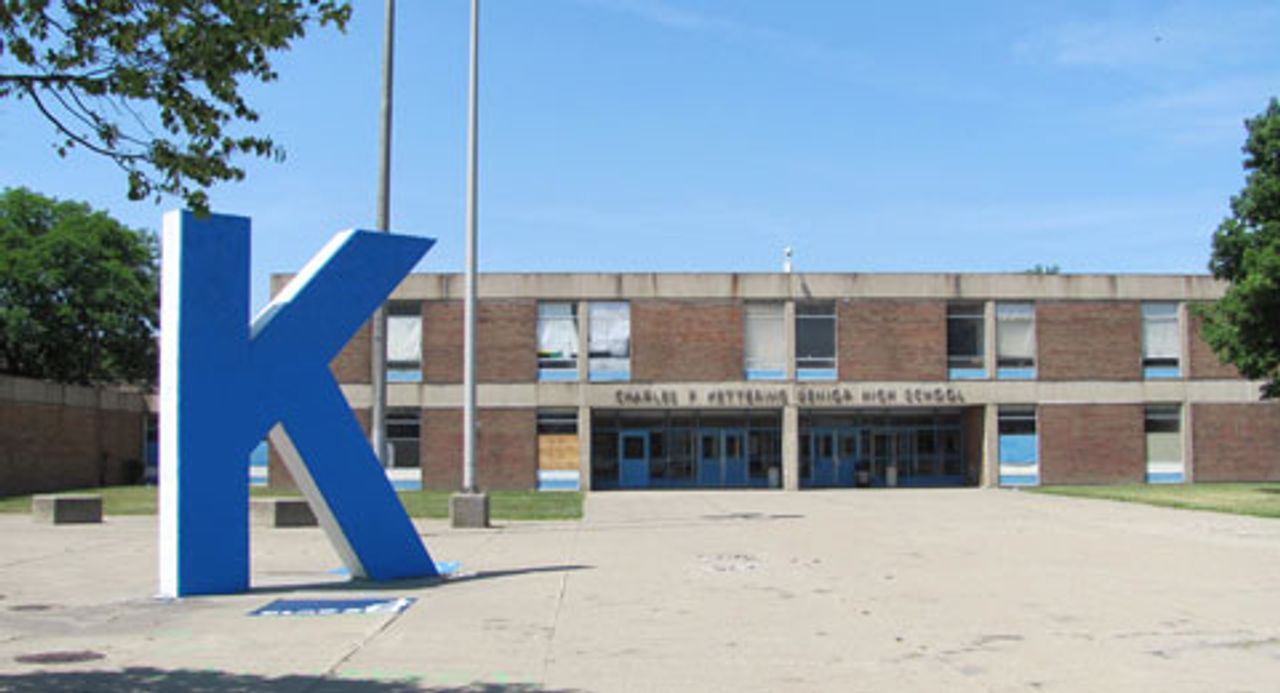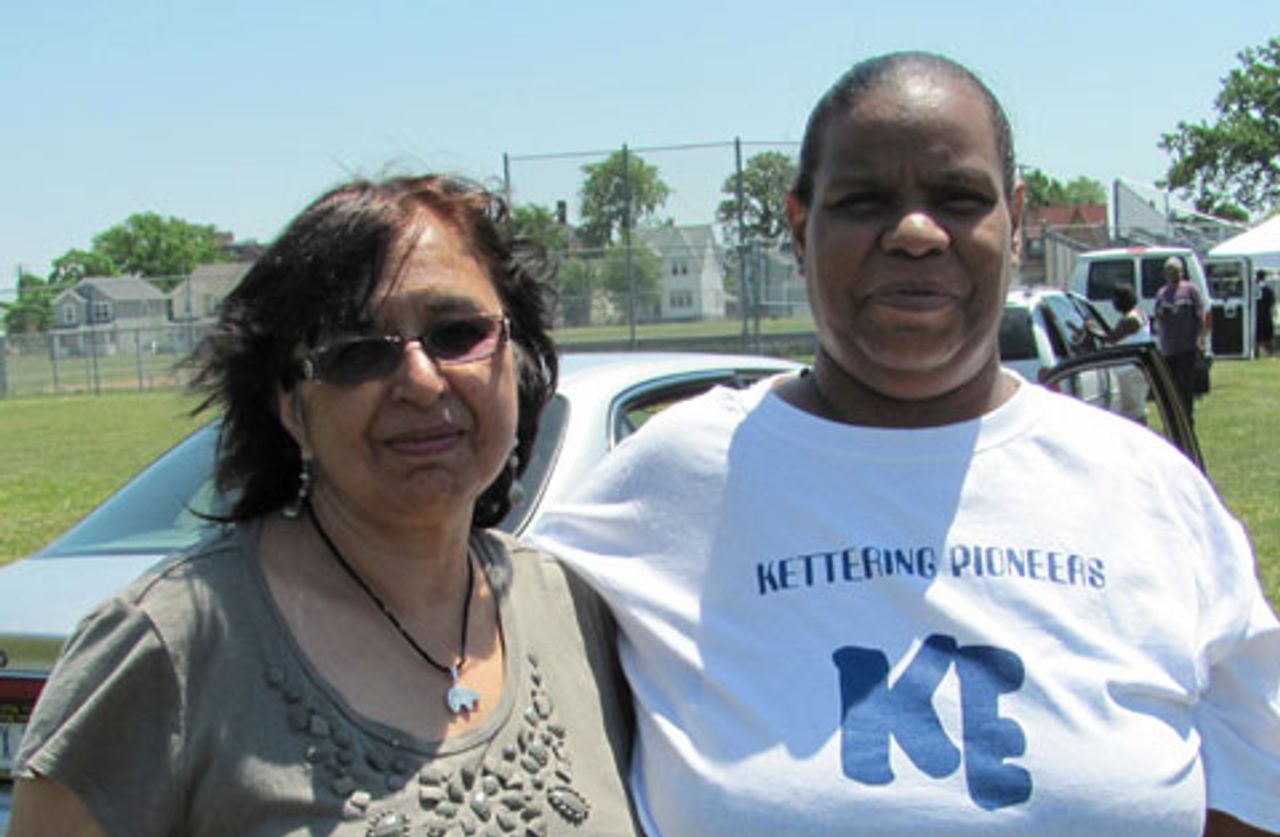On Saturday, about 100 people gathered for a farewell barbecue on the Charles F. Kettering High School grounds. Former teachers, support staff, alumni and some students congregated in a friendly but somber affair to reflect on their experiences at the school that educated the youth of this now-dilapidated east side neighborhood for more than 45 years.
 The Kettering High School campus
The Kettering High School campusSeveral months ago, Detroit Public Schools (DPS) emergency financial manager Roy Roberts, a former General Motors executive, announced yet another round of school closures in Detroit. Kettering High School was among those selected for termination. In addition, Roberts listed those schools that while remaining open would no longer be part of DPS, but would constitute a new district for so-called failed schools, the EAS (Education Achievement System).
The decision to close Kettering High School, actually one of the more recently constructed schools in the city, dovetails neatly with the plans of Detroit mayor David Bing and the Democratic Party-controlled City Council to “downsize” the city by cutting off services to the residents of the most rundown neighborhoods.
Kettering High School is located at the intersection of Van Dyke and Interstate 94 and was, at the time of its opening in 1965, the educational centerpiece in a vibrant neighborhood populated by thousands of auto workers and their families. The decision to build a high school in this neighborhood, which was bound up with the notion that working class youth deserved the best education possible, is light years away from the present-day right-wing and class-based education policies emanating from the Obama administration, Congress and this country’s ruling elite.
A pamphlet outlining the history of the school states: “A combination of residential, commercial and industrial expansion in northeast Detroit has focused attention on the Harper-Van Dyke community, resulting in the need for more educational facilities, especially at the secondary level. Accordingly, the Board of Education on May 5, 1960 moved to designate a site for a senior high school to serve the area.” The high school, which is named after the famous automotive engineer Charles F. Kettering, opened in September 1965, and its first graduating class crossed the stage in June 1969 (not that long ago, really).
By the late 1970s, however, fundamental changes in global economy had transformed the position of American capitalism with regard to its global competitors in Europe and Asia. This crisis resulted in a decades-long period of wanton and willful deindustrialization of major cities such as Detroit. For Detroit’s east side, dominated by Chrysler Motors, the subsequent plant closings devastated the area.
Today, with the spread of substandard and for-profit charter schools that drain both money and students from the public schools system, it is relatively easy for the political representatives of big business to justify the closing of another public school. But for the people that Kettering High School educated and cared for, it is another story entirely. Recently, Kettering was home to the West Wing, a school devoted to the care of the most severely impaired children—those with closed head injuries, fetal alcohol syndrome and autism. With the school’s closing, these students will be divided among several facilities, posing new challenges to the students, their families and caregivers.
The World Socialist Web Site spoke to some in attendance at Saturday’s barbecue about the closure of Kettering, and the impact the school has had on their lives.
 Darnell
DarnellDarnell graduated from Kettering in 2010, and is looking for work. “I think the closing of Kettering sucks. It really does. Kettering is an historic place. Much of my family and my friends have graduated from Kettering. It was a life-changing moment for me. I came to Kettering in my sophomore year, and it changed my life...kept me out of trouble. Kettering is a real family. I enjoyed the three years I was here
“They’re closing the schools because they believe that it can’t fulfill the needs of the system. But they have all the money to renew restaurants and stores...but not for the schools. We have been fighting for three years to keep the K open, against the directors of DPS, but it seems it’s been all a waste.”
Michelle Frazier, who has worked at Kettering as an aide for 17 years, spoke of the oppressed conditions of many of the families in the neighborhood. “I have three daughters who have graduated from Kettering. I didn’t believe it at first...about the school closing. I thought it was a rumor. But the economy is down. Parents are unemployed. They’re barely making it.”
Michelle pointed to the dilapidated neighborhood; “There’s not going to be a neighborhood if there are no neighbors.” She then stated hopefully that if Wayne County Community College buys the property, as it is rumored, things might get better. However, when the question of the West Wing, which houses and cares for the most severely impaired students, came up, Michelle became somber. “The closing of the West Wing is sad. The students will be sent to other facilities that can service their needs, but they were comfortable here. They wouldn’t be picked on. They were able to eat lunch with the other students. This year, they had the largest graduating class...more than 20. They came to the Homecoming Dance, and the Senior Prom...along with the regular seniors. They even spoke at the microphone. I was in tears. You felt there was a home here.”
 Yolanda Mitchell on right, with former Kettering teacher Maria Mayer on left
Yolanda Mitchell on right, with former Kettering teacher Maria Mayer on leftYolanda Mitchell graduated from Kettering in 1982. “This is not even an old school. Yes, the neighborhood has changed, but some people are not leaving. You know, it’s not always about saving money. If they hadn’t stole it, they wouldn’t have to worry about it. Where is all the lottery money that’s supposed to go to the schools?”
Yolanda expressed anger about the cuts in bus service. “Some of these kids don’t have parents. If they destroy the neighborhood, they will have nothing. That’s how I feel about the buses. How are these kids going to get to school? Many of these kids can’t get a ride. If they have an 8 o’clock class, they will have to leave at 5 in the morning because of the buses.”
Receive news and information on the fight against layoffs and budget cuts, and for the right to free, high-quality public education for all.
